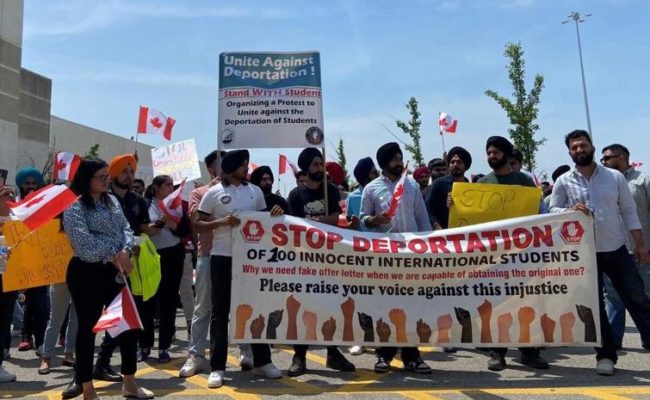Thousands of international students in Canada face deportation, sparking protests nationwide
- Posted on
- Comment

Canada is currently witnessing countrywide protests as more than 70,000 international student graduates could face deportation due to federal policy changes, and the unprecedented number of students who came to the country with dreams of a new life say their futures are now in limbo.
Representatives with Naujawan Support Network, a student advocacy group, said the graduates are at risk of being deported when their work permits expire at the end of this year. This comes after the Canadian government announced changes to its immigration policies, which included limiting study permits.
The impact has been devastating for these students. Tens of thousands who had planned to apply for permanent residency after completing their studies say they are now left with heavy loans and shattered dreams.
While it is never a promised pathway to cementing one’s future in Canada, foreign nationals have used study permits as an avenue to Permanent Residency and eventually citizenship for decades. What’s notable now, is that there is a record number of temporary residents who will be facing expiring work permits in the coming months. While speaking to reporters at the Liberal cabinet retreat in Halifax, Prime Minister Justin Trudeau agreed that these foreign workers were vital during a labour shortage due to the COVID-19 pandemic but says the country’s economic needs have changed since.
Alternate pathways to Permanent Residency and citizenship still remain open, with information available on the Government of Canada’s website.
Rallying coast-to-coast
International students across Canada are organizing protests against the backdrop of looming deportations.
A group of students have set up encampments outside the legislative assembly in Prince Edward Island, protesting overnight for more than three months.
The international students say they are facing a critical situation as new provincial policies for a 25 per cent reduction in permanent residency nominations have left many unexpectedly vulnerable to deportation.
Similar scenes can be witnessed in Ontario, Manitoba and British Columbia.
“I spent the most crucial six years of my life taking many risks to come to Canada,” says Mehakdeep Singh, a former international student who is facing deportation.
“For the past six years, I studied, I worked, I paid taxes, I earned enough CRS [Comprehensive Ranking System] points, but the government has just taken advantage of us.”
Related: Immigration, housing to headline cabinet retreat in Halifax
Singh is one of the former international students who spent his family’s life savings on tuition abroad. He is now facing the dreadful deadline of his work permit expiring, and there is no promise of permanent residency in sight.
“There isn’t consistency anymore,” explains Kanwar Sierah, an immigration consultant.
“At first, there were CEC [Canadian Experience Class] draws every two weeks, so they prepared for that. Now, students don’t know when the next draws will be, causing huge backlogs.”
Hundreds of international students and immigrant workers have held rallies in recent months throughout Brampton, pushing back against a narrative that blames them for local housing and job crises.
These students and advocacy groups, such as the International Sikh Student Organization, say that such problems are rooted in broader policy failures rather than the migration of international students.
They are calling on the federal government to extend work permits and provide clear pathways to permanent residency, emphasizing that they contribute significantly to the Canadian economy and deserve fair treatment.
Caught between hope and uncertainty
The protests reflect the growing frustration and desperation among international students who feel the government has unfairly targeted them.
Having invested heavily in education and the Canadian economy, they say they are now being told to finish their studies and return home while dealing with massive debts.
The students and their supporters are urging the government to extend post-graduate work permits, provide consistent and transparent pathways to permanent residency, and address the systemic issues that have led to their exploitation.
Without these changes, they say they fear that Canada will lose not only a significant portion of its skilled workforce but also the trust of future international students.
-City News










 (Selorm) |
(Selorm) |  (Nana Kwesi)
(Nana Kwesi)